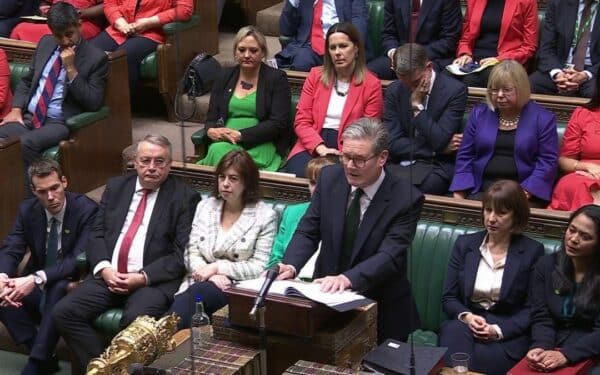When Margaret Thatcher became leader of the Conservative Party in 1975, she offered a clear and inspiring principle around which the centre-right could unite. That was freedom. Armed with the intellectual framework supplied by likes of Friedrich Hayek and Keith Joseph, she set the party on a mission to dismantle the collectivist post-war structures which she believed were suffocating individual liberty and private enterprise.
It was effective and has inspired a generation of Conservatives since, but it was the product of the late 20th century. Collectivism and planning were associated with the totalitarian horrors of Nazism and Stalinism. The world was in the grip of an ideological clash between communism and capitalism, and the threat to freedom seemed stark. What’s more, the electoral geography enabled such a message to resonate; the Tories could win elections by appealing narrowly to the winners from economic growth and competition.
The picture today looks very different. Economic stagnation is regarded by some voters not as a failure of Keynesianism and big government, but individualism and unbridled capitalism. The geopolitical map has changed entirely. As has the electoral landscape, which looks set to shift further. The political scientist Mathew Goodwin notes that “victories in Mansfield and Stoke-on-Trent and defeats in Battersea and Enfield Southgate could yet lead to a fuller realignment”.
Jumping on this, Theresa May and her former advisor Nick Timothy spotted an opportunity to try and wrestle the partyaway from the shadow of its most successful leader. The 2017 manifesto was an explicit rejection of the caricature of Thatcherism, stating that the party does not “believe in untrammelled free markets. We reject the cult of selfish individualism”. Emphasising “the good that government can do”, the document proposed policies such as capping energy bills and enhancing workers’ rights.
Following the disastrous election campaign and the humiliating result which ensued, the Conservative party needs to rediscover the importance of defending markets and private enterprise. The party needs a message and a messenger that can take on Corbyn. So, who are the potential runners and riders?
Sajid Javid and Jeremy Hunt, the front runners from within the cabinet, are both more economically classically liberal than May, with Javid an overt Thatcherite. But both are credible reformers. Javid has been impressive since becoming Home Secretary, quickly getting to grips with the Windrush scandal and displaying his liberal credentials over immigration and medical cannabis. This, along with his modest background and the prospect of becoming the first BAME Prime Minister, could win back the more liberal metropolitan voters which abandoned the party in 2017.
However, as former Remainers, the pair will struggle to win the trust of Brexiteers within the party as well as among the public. The nature of the Tory electorate has become more culturally conservative and pro-Brexit since the referendum, with the party hoovering up the former UKIP vote while haemorrhaging some of the middle-class professionals attracted by Cameron’s modernisation agenda. Javid has always been a Eurosceptic but opted reluctantly for Remain in 2016, predominantly out of loyalty to Cameron and Osborne. Hunt was a passionate Remainer who has transformed into a Brexiteer in the two years since the vote. Can the two broaden the party’s appeal while hanging on to the Brexity base?
Amongst the 2016 Leave supporting candidates in cabinet, Dominic Raab is tipped as the favourite. He is very much from the Thatcherite wing of the party and is a passionate Brexiteer. However, a video put out by the Labour party after he was appointed Brexit secretary was a warning of the challenges he would face if he were to become leader. The video highlighted his past opposition to workers rights and the Human Rights Act, as well as gaffes such as describing feminists as “obnoxious bigots” and claiming that food bank users are not “languishing in poverty”. Hardly the ideal candidate to detoxify free-markets and the Tory brand, perhaps.
Penny Mordaunt, the International Development Secretary, is another Brexiteer contender from government. She is from the right of the party but her overarching philosophical approach is not entirely clear. However, she has impressed at both ministerial and now cabinet level, with her recent address to Parliament in sign language gaining accolades from the across the House. She is a wild card for the leadership.
What of Gove? He looked a favourite in Spring but his approval rating amongst the Tory grassroots have plummeted since his outspoken support for the Chequers plan. An economic liberal and proven social reformer, he would offer an intellectually persuasive agenda for 21stcentury Conservatism that goes beyond Thatcherism. However, he still lacks popular appeal. Some in the Labour party relish a Gove leadership, regarding him as a toxic figure. What’s more, having made such a mess of his campaign last time, it’s unclear whether Conservative MPs would give him another crack at the leadership.
That leads us onto to the recipient of the infamous Gove backstabbing. Boris was originally a One Nation style Tory, more Heseltine than Thatcher.
But if it looked as though he had blown his chances during his gaffe-ridden stint as Foreign Secretary, Boris is back in vogue with Tory members after resigning over Brexit. The current furore over his Daily Telegraph article may also generate support among a similar demographic within the electorate, who are sick to death of what they see as the PC-mad, liberal establishment. That being said, a Boris Prime Ministership remains hard to fathom. Too many of his colleagues simply don’t trust him and so it is unlikely he’d make it onto the final ballot of two candidates who go to the membership in the country.
There are also several bright lights amongst the latest intake of Conservative MPs. The highly-impressive Kemi Badenoch has been tipped as a leadership contender since her maiden speech in the Commons last year. She cites Margaret Thatcher as her political hero and the libertarian economist Thomas Sowell as her intellectual inspiration. In an interview with the Evening Standard, she also drew links between Thatcher’s famous Grantham background and her upbringing in Nigeria.
The May premiership thus appears more of an aberration than a new chapter in the party’s ideological progression. The next leader is likely to be an economic liberal willing to defend markets and individual liberty against the resurgent threat of socialism under Corbyn. However, Thatcher’s rally call for freedom won’t be enough on its own in the modern context. Any future leader needs a message which also offers comprehensive social and economic reform, aimed at addressing the electorate’s grievances with the status quo.
In short, the Tories need a new message as well as a new messenger.



